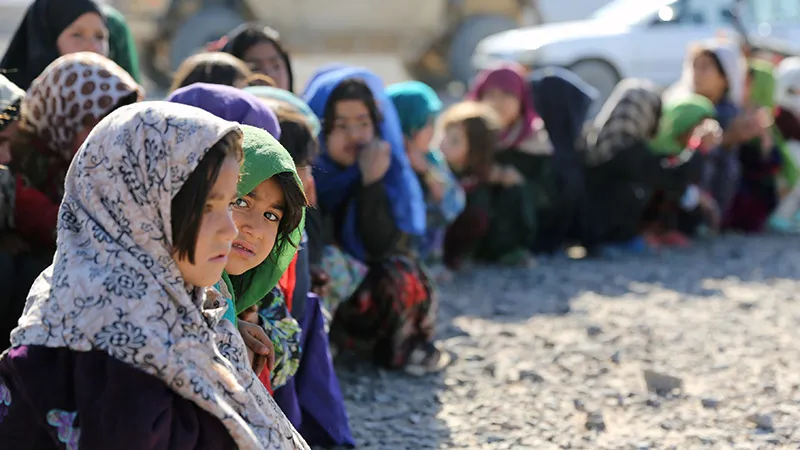-
CENTRES
Progammes & Centres
Location

Every year, the world celebrates Refugee Day in late June, an event that helps raise awareness about the plight, courage, and resilience of the world's refugees. By contrast, internally displaced persons (IDPs) have no day of their own. It is time for this discrepancy to change.
There is often little difference in the level of suffering experienced by refugees and IDPs. The only distinction between the two groups is that one — refugees — crosses an international border in attempting to flee hardship and danger, while the other — IDPs — moves inside the country where strife and/or socio-economic privation exists.
The difference between an IDP and a refugee is defined by international law. The 1951 Geneva Convention relating to the status of refugees provides for the protection and welfare of refugees outside their country of origin in states party to the convention. Thus, to be considered a refugee, one must cross an international border. Since IDPs do not cross borders, they have been deprived of many of the rights granted to refugees under international law.
Throughout the Cold War era, the international community caved into the ideological proxy politics of the western and the Communist blocs, and considered the problem of IDPs a sovereign issue to be dealt with internally. Even in the years following the end of the Cold War, the international community continued to treat IDPs as an internal problem. In recent years, however, it has become increasingly apparent that many displaced persons fleeing economic and political upheaval either have been unable to escape abroad, or have been prevented from crossing international borders. These people nevertheless were deserving of international protection in their countries of origin.
This realisation eventually led to the drafting of the UN Guiding Principles on Internal Displacement in 1988, which defines IDPs as "groups of persons who have been forced or obliged to flee or to leave their homes or places of habitual residence, in particular as a result of or in order to avoid the effects of armed conflict, situations of generalised violence, violations of human rights or human-made disasters, and who have not crossed an internationally recognised State border."
Unfortunately, Afghan IDPs have undergone every one of the above hardships over the past four decades. There are now more than 1.2 million IDPs across Afghanistan, many of them living in deplorable conditions. Yet aid organisations have avoided setting up camps for the IDPs, fearing that more battle-affected people would flock to the camps for assistance. While this may be a legitimate concern, IDPs, who are exposed to extreme danger in the restive south, east, and north of Afghanistan, deserve immediate assistance. Inaction is certain to encourage the Taliban and their criminal allies to recruit among the internally displaced people, who are desperate to ensure the basic survival of their families.
The story of Mohammad Azam Nawabi, an IDP in southern Afghanistan, is a prime example of the complex challenges facing IDPs. Nawabi told AlertNet: "We left our homes because of insecurity and now we are leaving this camp because of the same problem." Another IDP, Sahib Jan, added, "There is no water, no health clinic, no doctor, no school, and no job for us in the camp.. How can people live here?" And an IDP in Kabul, Raz Muhammad, recently complained to Amnesty International, "Food is a luxury here, no one can afford it. We mostly live off bread or spoiled vegetables from the market."
It is common sense that most IDPs, like refugees, need protection from ongoing conflicts and deserve to live free from the fear of persecution. As Afghanistan's National IDP Policy, adopted in 2014, recommends, if local integration is the right solution, IDP families must be assisted to settle legally, find jobs, and receive basic services such as clean water, electricity, education and healthcare. Or if return to their areas of origin is the best option, they must be helped to reintegrate on a sustainable basis in order to prevent their displacement again.
In accordance with the Afghan National Committee for Disaster Management, some 18,040 families have been driven out of their villages of origin by violence perpetrated by the Taliban in the northern and southern provinces of Kunduz, Helmand, and Uruzgan. These families, which constitute over 100,000 IDPs, have taken refuge in safer neighbouring provinces, where they urgently need relief assistance. Those, who have chosen to stay with their relatives and friends, also need aid, as the families that have offered to support them are extremely poor and should be assisted.
A multitude of national and international humanitarian organisations operate in Afghanistan with a mandate to alleviate the suffering of war-affected civilians, including IDPs. Among others, the Afghan Red Crescent (ARC), International Committee of Red Cross (ICRC), International Federation of Red Crescent (IFRC), United Nations High Commissioner for Refugees (UNHCR), United Nations Office for Coordination of Humanitarian Affairs (UNOCHA), International Organization for Migration (IOM), and World Food Program (WFP) possess the resources but should initiate collaboration with Afghanistan’s Ministry of Refugees and Repatriation and the National Disaster Management Authority to ease the plight of IDPs. Indeed, aid priority must be given to those groups of vulnerable Afghans, including women and children, who have recently been driven from their areas of origin due to ongoing conflicts.
The views expressed above belong to the author(s). ORF research and analyses now available on Telegram! Click here to access our curated content — blogs, longforms and interviews.

Ashraf Haidari was a Visiting Fellow at ORF. He also serves as Extraordinary and Plenipotentiary Ambassador of Afghanistan to Sri Lanka.
Read More +